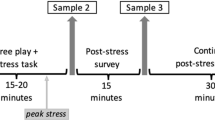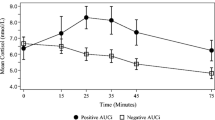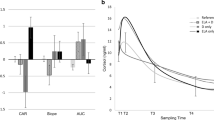Abstract
Maternal HPA axis dysregulation during early pregnancy can negatively affect maternal functioning. However, findings are mixed regarding how intimate partner violence (IPV), a common traumatic stressor, impacts HPA axis regulation during pregnancy. Interactions between IPV and mental health symptoms as they influence cortisol production are rarely examined, especially among pregnant women. Therefore, this study examined the impact of IPV, mental health symptoms, and their interactions on the maternal HPA axis during early pregnancy; 255 pregnant women, oversampled for experiences of IPV, completed a laboratory stressor and measures of depressive and post-traumatic stress symptoms (PTSS) at 15–18 weeks of pregnancy. Participants provided saliva samples following the Trier Social Stress Test that were assayed for cortisol; the area under the curve with respect to ground (AUCg) was computed as a measure of cortisol reactivity. The interactive effects of IPV, depressive symptoms, and PTSS on AUCg were significant, but the main effects were not. At low levels of depressive symptoms, the association between IPV and AUCg was negative; at moderate levels of depressive symptoms, it was not significant, and at high levels, it was positive. At low and moderate levels of PTSS, the effects of IPV on cortisol AUCg were not significant, but at high levels, the association was positive. IPV during early pregnancy was associated with both hyperactive and blunted stress reactivity, depending on the type and severity of mental health symptoms. These patterns of dysregulation of the HPA axis may have differential effects both for women’s functioning throughout pregnancy as well as for the offspring.


Similar content being viewed by others
References
Basu A, Levendosky AA, Lonstein JS (2013) Trauma sequelae and cortisol levels in women exposed to intimate partner violence. Psychodynamic Psychiatry 41(2):247–275. https://doi.org/10.1521/pdps.2013.41.2.247
Van den Bergh BR, van den Heuvel MI, Lahti M, Braeken M, de Rooij SR, Entringer S, ... Schwab M (2020) Prenatal developmental origins of behavior and mental health: the influence of maternal stress in pregnancy. Neuroscience & Biobehavioral Reviews, 117, 26–64. https://doi.org/10.1016/j.neubiorev.2017.07.003
Bernstein DP, Fink L (1998) Childhood trauma questionnaire: a retrospective self-report. San Antonio, TX: The Psychological Cooperation. https://psycnet.apa.org/doi/https://doi.org/10.1037/t02080-000
Blevins CA, Weathers FW, Davis MT, Witte TK, Domino JL (2015) The posttraumatic stress disorder checklist for DSM-5 (PCL-5): development and initial psychometric evaluation. J Trauma Stress 28(6):489–498. https://doi.org/10.1002/jts.22059
Bogat GA, Martinez-Torteya C, Levendosky AA, von Eye A, Lonstein J (2016) Intimate partner violence, mental health, and HPA Axis functioning. J Person Oriented Res 2((1–2)):111–122
Braithwaite EC, Murphy SE, Ramchandani PG (2016) Effects of prenatal depressive symptoms on maternal and infant cortisol reactivity. Arch Womens Ment Health 19:581–590. https://doi.org/10.1007/s00737-016-0611-y
Buss C, Davis EP, Shahbaba B, Pruessner JC, Head K, Sandman CA (2012) Maternal cortisol over the course of pregnancy and subsequent child amygdala and hippocampus volumes and affective problems. Proc Natl Acad Sci 109(20):E1312–E1319. https://doi.org/10.1073/pnas.1201295109
Cohen J, Cohen P, West SG, Aiken LS (2003) Applied multiple regression/correlation analysis for the behavioral sciences (3rd ed.). Lawrence Erlbaum Associates Publishers. http://ezproxy.msu.edu/login?url=https://www.proquest.com/books/applied-multiple-regression-correlation-analysis/docview/616017305/se-2?accountid=12598
Cordero MI, Moser DA, Manini A, Suardi F, Sancho-Rossignol A., Torrisi, R., ... Schechter DS (2017) Effects of interpersonal violence-related post-traumatic stress disorder (PTSD) on mother and child diurnal cortisol rhythm and cortisol reactivity to a laboratory stressor involving separation. Hormones and Behavior, 90, 15–24. https://doi.org/10.1016/j.yhbeh.2017.02.007
Cox JL, Holden JM, Sagovsky R (1987) Detection of postnatal depression: development of the 10-item Edinburgh Postnatal Depression Scale. Br J Psychiatry 150(6):782–786. https://doi.org/10.1192/bjp.150.6.782
Davis EP, Sandman CA (2010) The timing of prenatal exposure to maternal cortisol and psychosocial stress is associated with human infant cognitive development. Child Dev 81:131–148. https://doi.org/10.1111/j.1467-8624.2009.01385.x
Deligiannidis KM, Kroll-Desrosiers AR, Svenson A, Jaitly N, Barton BA, Hall JE, Rothschild AJ (2016) Cortisol response to the Trier Social Stress Test in pregnant women at risk for postpartum depression. Archives of Womens Mental Health 19:789–797. https://doi.org/10.1007/s00737-016-0615-7
Dickens MJ, Pawluski JL (2018) The HPA axis during the perinatal period: implications for perinatal depression. Endocrinology 159:3737–3746. https://doi.org/10.1210/en.2018-00677
Duthie L, Reynolds RM (2013) Changes in the maternal hypothalamic-pituitary-adrenal axis in pregnancy and postpartum: influences on maternal and fetal outcomes. Neuroendocrinology 98:106–115. https://doi.org/10.1159/F000354702
Edwards LD, Heyman AH, Swidan S (2011) Hypocortisolism: an evidence-based review. Integrative Medicine 10(4):30–37
Epstein CM, Houfek JF, Rice MJ, Weiss SJ (2021) Integrative review of early life adversity and cortisol regulation in pregnancy. J Obstet Gynecol Neonatal Nurs 50(3):242–255. https://doi.org/10.1016/j.jogn.2020.12.006
Fries E, Dettenborn L, Kirschbaum C (2009) The cortisol awakening response (CAR): facts and future directions. Int J Psychophysiol 72(1):67–73. https://doi.org/10.1016/j.ijpsycho.2008.03.014
Geier TJ, Hunt JC, Nelson LD, Brasel KJ, deRoon-Cassini TA (2019) Detecting PTSD in a traumatically injured population: the diagnostic utility of the PTSD Checklist for DSM-5. Depress Anxiety 36:170–178. https://doi.org/10.1002/da.22873
Gelaye B, Rondon MB, Araya R, Williams MA (2016) Epidemiology of maternal depression, risk factors, and child outcomes in low-income and middle-income countries. The Lancet Psychiatry 3(10):973–982. https://doi.org/10.1016/S2215-0366(16)30284-X
Glover V (2020) Prenatal mental health and the effects of stress on the foetus and the child Should psychiatrists look beyond mental disorders. World Psychiatry 19(3):331. https://doi.org/10.1002/wps.20777
Kim HK, Tiberio SS, Capaldi DM, Shortt JW, Squires EC, Snodgrass JJ (2015) Intimate partner violence and diurnal cortisol patterns in couples. Psychoneuroendocrinology 51:35–46. https://doi.org/10.1016/j.psyneuen.2014.09.013
Kirschbaum C, Pirke KM, Hellhammer DH (1993) The ‘Trier Social Stress Test’–a tool for investigating psychobiological stress responses in a laboratory setting. Neuropsychobiology 28(1–2):76–81. https://doi.org/10.1159/000119004
Kline RB (2016) Principles and practice of structural equation modeling, 4th Edn. New York, NY: Guilford Press. http://ezproxy.msu.edu/login?url=https://www.proquest.com/books/principles-practice-structural-equation-modeling/docview/620723529/se-2
Levis B, Negeri Z, Sun Y, Benedetti A, Thombs BD (2020) Accuracy of the Edinburgh Postnatal Depression Scale (EPDS) for screening to detect major depression among pregnant and postpartum women: systematic review and meta-analysis of individual participant data. BMJ 371:m4022. https://doi.org/10.1136/bmj.m4022
Maripuu M, Wikgren M, Karling P, Adolfsson R, Norrback KF (2014) Relative hypo-and hypercortisolism are both associated with depression and lower quality of life in bipolar disorder: a cross-sectional study. PLoS ONE 9(6):e98682. https://doi.org/10.1371/journal.pone.0098682
Marshall LL (1992) Development of the severity of violence against women scales. Journal of Family Violence 7:103–121. https://doi.org/10.1007/BF00978700
Mendez-Figueroa H, Dahlke JD, Vrees RA, Rouse DJ (2013) Trauma in pregnancy: an updated systematic review. Am J Obstet Gynecol 209(1):1–10. https://doi.org/10.1016/j.ajog.2013.01.021
Murphy SE, Braithewaite EC, Hubbard I, Williams KV, Tindall E, Holmes EA, Ramchandani PG (2015) Salivary cortisol response to infant distress in pregnant women with depressive symptoms. Arch Womens Ment Health 18:247–253. https://doi.org/10.1007/s00737-014-0473-0
Muthén LK, Muthén BO (2015) Mplus 7.4. Muthén & Muthén, Los Angeles, CA, p 3463
Narvaez Linares NF, Charron V, Ouimet AJ, Labelle PR, Plamondon H (2020) A systematic review of the Trier Social Stress Test methodology: issues in promoting study comparison and replicable research. Neurobiology of Stress 13:100235. https://doi.org/10.1016/j.ynstr.2020.100235
O’Connor TG, Tang W, Gilchrist MA, Moynihan JA, Pressman EK, Blackmore ER (2014) Diurnal cortisol patterns and psychiatric symptoms in pregnancy: short-term longitudinal study. Biol Psychol 96:35–41
Orta OR, Gelaye B, Bain PA, Williams MA (2018) The association between maternal cortisol and depression during pregnancy, a systematic review. Arch Womens Ment Health 21:43–53. https://doi.org/10.1007/s00737-017-0777-y
Papadimitriou A, Priftis KN (2009) Regulation of the hypothalamic-pituitary-adrenal axis. NeuroImmunoModulation 16(5):265–271. https://doi.org/10.1159/000216184
Peterson GF, Espel EV, Davis EP, Sandman CA, Glynn LM (2020) Characterizing prenatal maternal distress with unique prenatal cortisol trajectories. Health Psychol 39:1013–1019. https://doi.org/10.1037/hea0001018
Pico-Alfonso MA, Garcia-Linares MI, Celda-Navarro N, Herbert J, Martinez M (2004) Changes in cortisol and dehydroepiandrosterone in women victims of physical and psychological intimate partner violence. Biol Psychiat 56(4):233–240. https://doi.org/10.1016/j.biopsych.2004.06.001
Pinna KL, Johnson DM, Delahanty DL (2014) PTSD, comorbid depression, and the cortisol waking response in victims of intimate partner violence: preliminary evidence. Anxiety Stress Coping 27(3):253–269. https://doi.org/10.1080/10615806.2013.852185
Pinto RJ, Correia-Santos P, Costa-Leite J, Levendosky AA, Jongenelen I (2016) Cortisol awakening response among women exposed to intimate partner violence. Psychoneuroendocrinology 74:57–64. https://doi.org/10.1016/j.psyneuen.2016.08.024
Pruessner JC, Kirschbaum C, Meinlschmid G, Hellhammer DH (2003) Two formulas for computation of the area under the curve represent measures of total hormone concentration versus time-dependent change. Psychoneuroendocrinology 28(7):916–931. https://doi.org/10.1016/S0306-4530(02)00108-7
Rinne GR, Hartstein J, Guardino CM, Schetter CD (2023) Stress before conception and during pregnancy and maternal cortisol during pregnancy: a scoping review. Psychoneuroendocrinology 153:106115. https://doi.org/10.1016/j.psyneuen.2023.106115
Román-Gálvez RM, Martín-Peláez S, Martínez-Galiano JM, Khan KS, Bueno-Cavanillas A (2021) Prevalence of intimate partner violence in pregnancy: an umbrella review. Int J Environ Res Public Health 18(2):707. https://doi.org/10.3390/ijerph18020707
Scott EM, McGarrigle HHG, Lachelin GCL (1990) The increase in plasma and saliva cortisol levels in pregnancy is not due to the increase in corticosteroid-binding globulin levels. J Clin Endocrinol Metab 71:639–644
Seedat S, Stein MB, Kennedy CM, Hauger RL (2003) Plasma cortisol and neuropeptide Y in female victims of intimate partner violence. Psychoneuroendocrinology 28(6):796–808. https://doi.org/10.1016/S0306-4530(02)00086-0
Seng JS, Li Y, Yang JJ, King AP, Low LMK, Sperlich M, ... Liberzon I (2018) Gestational and postnatal cortisol profiles of women with posttraumatic stress disorder and the dissociative subtype. J Obstetric, Gynecol Neonatal Nursing. 47(1):12–22. https://doi.org/10.1016/j.jogn.2017.10.008
Spencer C, Mallory AB, Cafferky BM, Kimmes JG, Beck AR, Stith SM (2019) Mental health factors and intimate partner violence perpetration and victimization: A meta-analysis. Psychol Viol 9(1):1
Thomas JC, Letourneau N, Campbell TS, Giesbrecht GF, Apron Study Team (2018) Social buffering of the maternal and infant HPA axes: mediation and moderation in the intergenerational transmission of adverse childhood experiences. Development Psychopathol 30(3):921–939. https://doi.org/10.1017/S0954579418000512
Urizar GG Jr, Yim IS, Kofman YB, Tilka N, Miller K, Freche R, Johnson A (2019) Ethnic differences in stress-induced cortisol responses: increased risk for depression during pregnancy. Biol Psychol 147:107630. https://doi.org/10.1016/j.biopsycho.2018.12.005
Wang R, Wang J, Xu S, Wang L, Song M, An C, Wang X (2022) Prenatal earthquake stress exposure in different gestational trimesters is associated with methylation changes in the glucocorticoid receptor gene (NR3C1) and long-term working memory in adulthood. Transl Psychiatry 12:176. https://doi.org/10.1038/s41398-022-01945-7
Yildiz PD, Ayers S, Phillips L (2017) The prevalence of posttraumatic stress disorder in pregnancy and after birth: a systematic review and meta-analysis. J Affect Disord 208:634–645. https://doi.org/10.1016/j.jad.2016.10.009
Funding
Eunice Kennedy Shriver National Institute of Child Health and Human Development, 1R01HD085990-01A1, Alytia A Levendosky, G. Anne Bogat, Joseph S. Lonstein, and Maria Muzik.
Author information
Authors and Affiliations
Corresponding author
Ethics declarations
Conflict of interest
The authors declare no competing interests.
Additional information
Publisher's Note
Springer Nature remains neutral with regard to jurisdictional claims in published maps and institutional affiliations.
Rights and permissions
Springer Nature or its licensor (e.g. a society or other partner) holds exclusive rights to this article under a publishing agreement with the author(s) or other rightsholder(s); author self-archiving of the accepted manuscript version of this article is solely governed by the terms of such publishing agreement and applicable law.
About this article
Cite this article
Levendosky, A.A., Martinez-Torteya, C., Ballinger, A.L. et al. The effects of IPV and mental health symptoms on HPA axis functioning during early pregnancy. Arch Womens Ment Health 27, 285–292 (2024). https://doi.org/10.1007/s00737-023-01399-w
Received:
Accepted:
Published:
Issue Date:
DOI: https://doi.org/10.1007/s00737-023-01399-w




